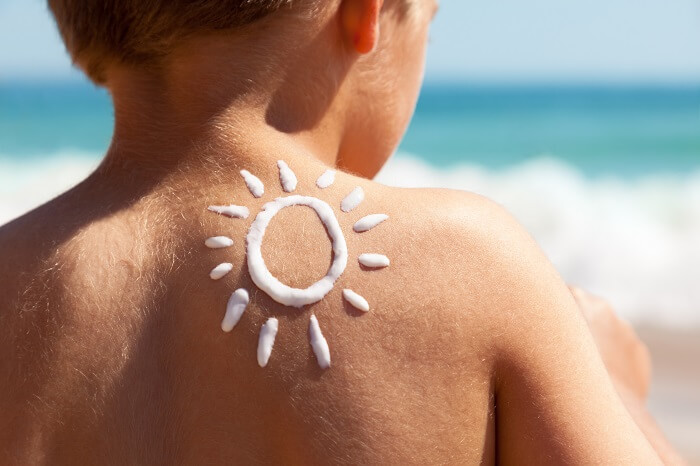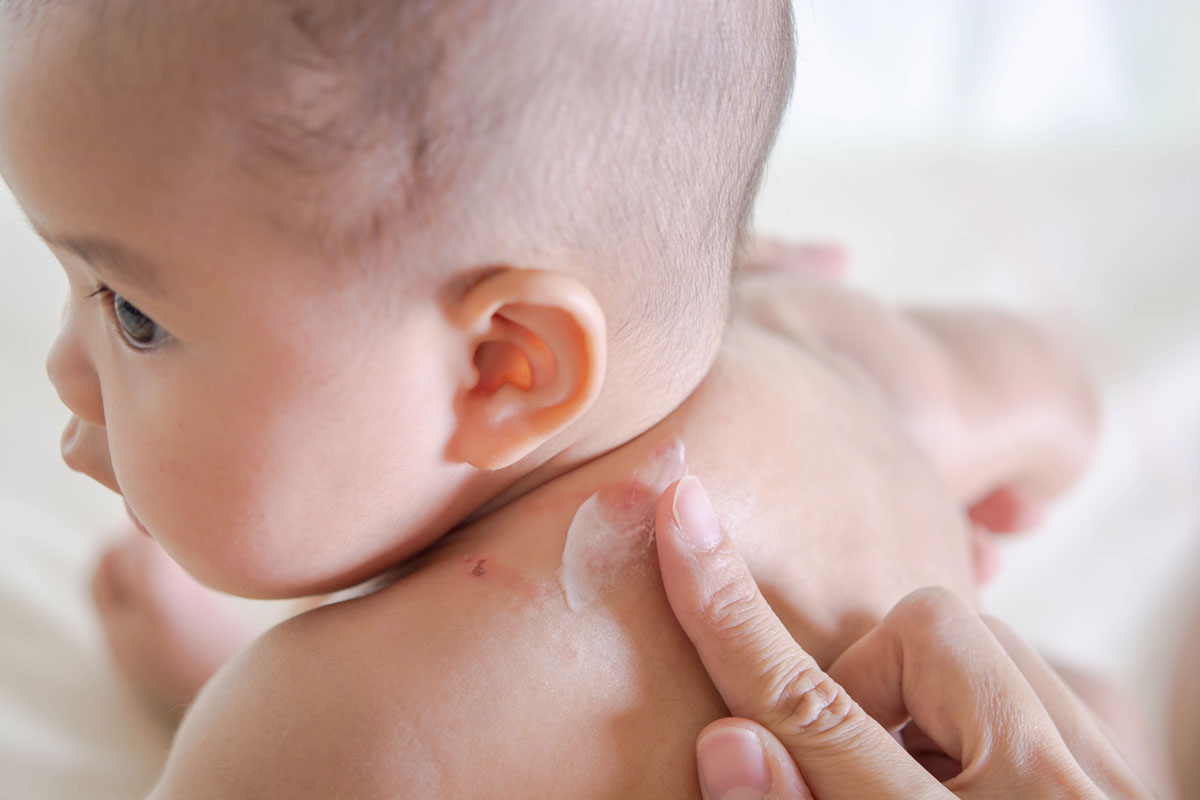Sensitive Skin in Children
What to do if the skin itches?
A child's skin is not only more delicate and softer than an adult's, but also more sensitive. Often, it reacts sensitively to external influences, leading to skin irritations, dryness, and itching. As a parent, it can be distressing when your child suffers from skin problems, especially when the cause is not immediately apparent.
In this article, we will explore the peculiarities of sensitive children's skin, why it reacts so sensitively, and what you can do to provide relief for your child. From everyday care tips to signs of skin diseases – here you will find all the information you need to keep your child's skin healthy and supple.
Care for sensitive skin in children and babies
Linola Baby & Kind
Difference between Children's Skin and Adult Skin
Why children's skin is so sensitive

The skin, our largest organ, is fundamentally the same in children and adults. It consists of three main layers: the epidermis, the dermis, and the subcutis. However, despite these similarities, there are crucial differences between children's skin and adult skin.
- Thin skin layers: In children, the skin layers are significantly thinner than in adults. This means that the sensitive skin of children is not yet fully matured. Its thin nature makes it more susceptible to external influences.
- Moisture loss: Due to its thinness, moisture can escape from children's skin more quickly. At the same time, irritants and harmful substances can penetrate the skin more easily, leading to redness and irritation.
- Larger skin surface: Compared to body volume, the skin surface in children is larger than in adults. This means that children's skin dries out and cools down faster, requiring special care.
- Less sebum and sweat production: The skin of babies and children produces little sebum and sweat. As a result, the skin's acid mantle, which serves as a natural defence against bacteria and other harmful influences, is less resilient.
Parents should be aware of these differences to optimally protect and care for their children's sensitive skin. With the right products and tailored skincare, many skin problems can be avoided.
Caring for Sensitive Children's Skin
What to consider in skincare
Sensitive children's skin has specific care requirements. Due to its unique characteristics, children's skin type can generally be described as dry and sensitive. Here are some tips and recommendations to optimally care for your child's skin:
- Avoid irritating ingredients: Especially perfumes and fragrances can irritate sensitive children's skin. Therefore, look for products that do not contain these ingredients.
- Fat and moisture: Creams and lotions should have a balanced proportion of fat and moisture. This helps protect the skin from moisture loss and keeps it supple. A specific face cream is usually not necessary. An ideal choice is a fragrance-free lotion for children that absorbs quickly and is suitable for both face and body.
- Regular moisturising: After bathing, showering, a visit to the swimming pool, or a trip to the sea, the child's skin should be moisturised. However, be sparing with the amount. Use only as much lotion as the skin can absorb to avoid over-moisturising.

Can you over-moisturise babies and children?
"Definitely! If the skin of babies and children is over-moisturised, it can struggle to regulate itself, and the development of the natural skin barrier can be disrupted. Therefore, when it comes to skincare for the little ones: Less is more!"
Edith Janzen, Midwife at the Birthing Centre Bielefeld, Germany
- Caution when bathing: Frequent contact with water and soap can dry out the skin. Although children should naturally be washed regularly, especially after extensive play and frolicking, bath time should not exceed 10 minutes, and the water should only be lukewarm.
- Child-friendly cleaning products: Instead of soap, a soap-free, pH-neutral shower gel and a mild shampoo specifically designed for children are recommended.
- Skin protection in winter: During the cold months, the skin can become particularly dry. If necessary, use a richer lotion or cream and protect your child's face from cold and wind.
- Sun protection is a must: The sensitive skin of children should always be protected from direct sunlight. Use a sunscreen with a high SPF and ensure your child plays in the shade, especially during midday hours.
SOS Tips for Itching
The best alternatives to scratching
Every parent knows it: Sensitive children's skin can quickly become dry, which can trigger itching from time to time. Be it due to the cold and dry air in winter or intense sunlight in summer. But what to do when the child keeps scratching, further irritating the skin?
- Avoid scratching: As difficult as it may be, scratching can worsen the situation. Scratching injures the top layer of the skin, making it easier for irritants to penetrate. This can lead to even more itching, creating a vicious cycle.
- Cooling: A cooling pad wrapped in a towel can provide relief. The cold soothes the irritated skin and reduces itching.
- Rich skincare: A richer lotion that forms a protective film on the skin can help prevent further itching. This protective film prevents moisture from escaping from the skin and protects against external irritants.
- Cotton clothing: Cotton is breathable and doesn't further irritate the skin. Avoid synthetic fabrics that can irritate the skin. Tip: Labels in clothing can chafe and irritate sensitive children's skin. It's best to cut out these small tags from T-shirts, jumpers, etc., if your child keeps scratching their neck or side.
- Short fingernails: Keep your child's fingernails short to minimise skin injuries when scratching.
- Avoid perfumes and fragrances: As mentioned earlier, these substances can further irritate the skin. Use fragrance-free products to avoid irritation and not exacerbate the itching.
- Soothing baths: A bath with an oil-based bath additive can provide the dry skin with the necessary fat and moisture, thus alleviating the itching. However, also ensure here to keep the bath time short and the water temperature lukewarm.
With these tips, you can help your child alleviate itching and protect their sensitive skin. It's essential to pay attention to the skin's signals and act accordingly.

"Pay attention to the needs of your offspring's skin. If your child's skin is dry or irritated, you can counteract it with the appropriate care. However, if additional symptoms arise, it may be advisable to consult a doctor."
Edith Janzen, Midwife at the Birthing Centre Bielefeld, Germany
Causes of Itchy Skin in Children
Common Skin Diseases
While occasional itching in children is often caused by external factors such as dry air or improper care, persistent and intense itching, especially in combination with other skin changes, can be a sign of a skin disease.
It's important to stress that if there are signs of a skin disease, a paediatrician or dermatologist should always be consulted. Here you can get an overview of the most common skin diseases in children that can be accompanied by itching:
- Eczema (atopic dermatitis): One of the most common skin diseases in babies and children is atopic dermatitis. It is characterised by dry, flaky skin, redness, and intense itching. Symptoms often occur in flare-ups.
- Contact dermatitis: This occurs when the skin comes into contact with irritating substances. Typical triggers can be certain soaps, detergents, or metals.
- Urticaria (hives): This involves itchy welts or swellings that can suddenly appear. They can be triggered by allergies, infections, or other causes.
- Psoriasis: A chronic skin disease characterised by red, flaky patches. It can also occur in children but is less common than eczema.
- Fungal infections: Certain fungi can infect the skin, causing itching, redness, and flaking.
- Scabies: A skin disease caused by mites, causing intense itching, especially at night.
When Children's Skin Itches Without a Rash
It's not uncommon for children to complain of itching even when there are no visible signs like a rash, redness, or swelling. This can often concern parents as the cause is not immediately apparent. Here are some reasons why children's skin might itch, even if the skin condition otherwise seems normal:
- Dry skin: This is one of the most common causes of itching without visible skin changes. Especially in the winter months or in air-conditioned rooms, the air can be dry, dehydrating the skin.
- Overheating: Sweating and overheating, especially in tight-fitting clothing, can cause itching, even without visible skin irritations.
- Allergic reactions: Sometimes, allergens in laundry detergent, fabric softeners, or certain foods can cause itching without a rash appearing.
- Psychological factors: In some children, stress or anxiety can lead to a feeling of itching, even if there's no physical cause.
- External irritants: The skin can be irritated by certain soaps, bath additives, or even the chlorine in swimming pools, resulting in itching.
If your child complains of itching, even if no rash is visible, it's important to determine the exact cause. It can be helpful to note changes in the environment, diet, or daily routine that might have triggered the itching.
For persistent itching or if you're unsure, always consult a paediatrician or dermatologist. It's always better to be safe and ensure your child receives the best care.
Linola Baby & Kind
For baby-soft skin
Content verified by

Content verified by: Edith Janzen
Edith Janzen has been a midwife at the Birthing Centre Bielefeld in Germany since 2012 and is a mother herself. Her areas of expertise include out-of-hospital obstetrics, prenatal care, and postnatal care. She supports numerous families from the beginning of pregnancy through childbirth to the end of the postpartum period, providing advice and assistance during this special phase of life.
Additional topics & information
All about child and baby care

Moisturising Your Baby – What Matters in Baby Skin Care
To moisturise your baby or not? This question can't be answered broadly. What's certain is that baby skin is much thinner than that of adults and therefore needs special protection. Here, you'll find tips on what to consider for baby care.

Sun Protection for Babies and Children – Tips for Parents
The skin of babies and children reacts particularly sensitively when exposed to the sun without protection. Sun protection involves more than just sunscreen. Here, parents can find tips on what matters when it comes to protecting babies and children from the sun.

Rough patches on the body – What to do about rough baby skin?
The sensitive baby skin can quickly become rough and show dry areas. There are a variety of possible causes – most of them are harmless. Here, you'll learn how to care for and soften rough skin in babies.





